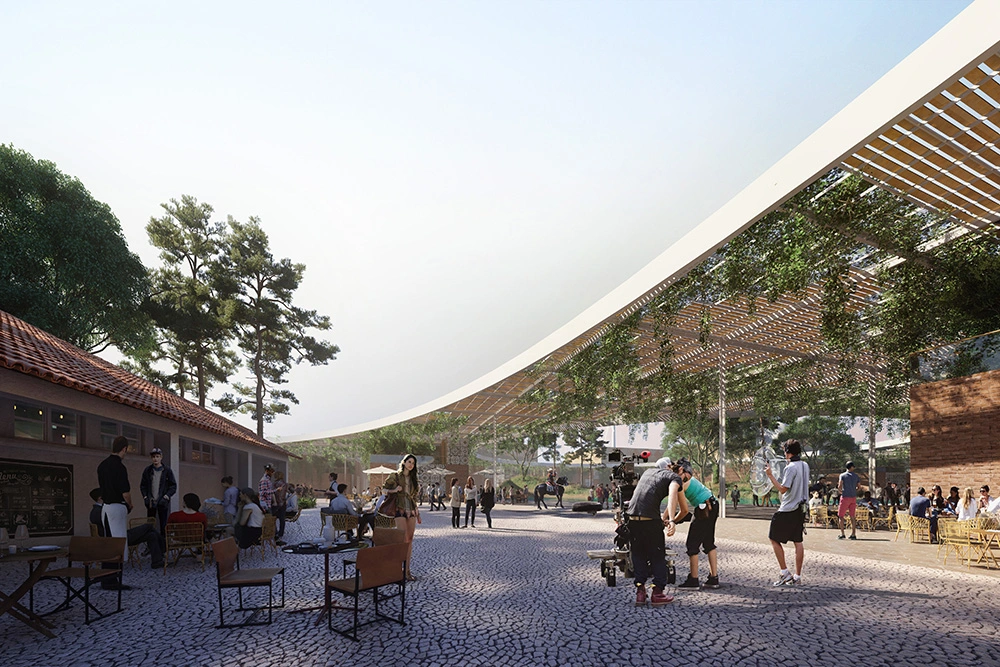Tage Studios: Lights, Camera, Sustainability - Europe's First Entirely Green Shooting Facility
Tage Studios is set to become Europe's first entirely green shooting facility, featuring solar panels, rainwater recovery, and recycled materials. Lights, camera, sustainability.

In a world where environmental sustainability is becoming increasingly important, Portugal’s Tage Studios is set to take the film industry by storm with its new €200 million ($215 million) green film studio project. The facility, which will be built near Palmela, just outside of Lisbon, is set to be the first entirely eco-friendly backlot in Europe, and possibly the world.
The design of the studio is such that every soundstage and facility building is designed to be a near-zero-energy structure, with rooftop photovoltaic panels providing electricity and rainwater recovery and reuse systems cutting down on water waste. The material used for construction will also be locally sourced and/or recycled, with at least 85 percent recovery of all site construction waste.
“The idea was to create a benchmark studio, one that will be eco-friendly and self-sustainable from day one, making it the world’s first for film and television facilities,” says David Hallyday, founder and director of Tage Studios.
There are no examples to follow, Hallyday continues. “Designing everything, from fixtures and equipment to the buildings and grounds, to meet both the highest environmental standards and to provide international productions with the top-level service and reliability they expect — we need this studio to be 24/7, 100 percent reliable and safe from day one — that’s been the biggest challenge.”

The Portuguese government has been fully supportive of the project, declaring the studio to be of national interest. The country has set ambitious goals to reduce greenhouse gas emissions, increase the use of renewable energy, and promote eco-friendly practices, making it the perfect location for a green film studio.
The studio’s true competitive edge, however, could come from its planet-friendly design. Major studios and streamers are now taking the environmental impact of a production into account when deciding where to shoot. And Europe’s entire state-backed film subsidy and tax incentive system is slowly going green.
“Planning a studio the way we have, making sustainability and environmental impact a priority at every stage, is very, very expensive and very time-consuming,” admits Hallyday. “But we really don’t have another option. This isn’t something we can do halfway. And we’re confident this is the way the industry is — has to be — in the future.”
Tage Studios’ project is expected to begin construction in late 2024 or early 2025, with plans to create a 5,200-square-meter major soundstage along with six other stages ranging in size from 2,000 to 3,600 square meters, an external backlot area of around 55,000 square meters, and an outdoor water tank. Once complete, the facility would be Europe’s largest in terms of studio space, ahead of Pinewood, Warner Leavesden, and Babelsberg, though Warner’s huge backlot — more than 55 acres of available space — dwarfs even Tage’s ambitious plans.
With the technology available now, the studio is built from the ground up with state-of-the-art innovation, not retrofitting. “We can’t wait to scream to the world about the opportunity to shoot in this magical, innovative environment,” said Debbie Levin, CEO of the Environmental Media Association.
“Biodiversity is something that will be integrated into every stage of the project,” says Maria Quiros Grande, a real estate director at Deloitte. “It impacts things as seemingly trivial as window design. All our windows will be deglazed to avoid bird collisions. And the lighting system will be such so that there is minimal light pollution, and operations at night do not disturb the nocturnal rhythms of the surrounding wildlife.”
The studio’s emphasis on using recycled materials, a rainwater recovery system, and an effort to preserve local biodiversity, all contribute to the eco-friendly and self-sustainable nature of the project.
Portugal has already been successful in attracting some big international projects, but the country still lacks a major sound studio. Tage Studios aims to fill this gap, and with its sustainable design, could set the standard for the film industry in terms of environmental impact.
“Think about the technology available now from the ground up. This is not about retrofitting, it’s about state-of-the art innovation for our industry,” said Debbie Levin, CEO of the Environmental Media Association, which is consulting with Tage Studios on the project.
Europe’s Green New Deal sets an ambitious target of making the continent climate-neutral by 2050, a goal that will put further pressure on Europe’s film and TV industry to start making CO2 emissions a factor in funding decisions. Tage Studios’ commitment to sustainability could help the industry meet these goals and lead the way towards a more eco-friendly future.
.png)